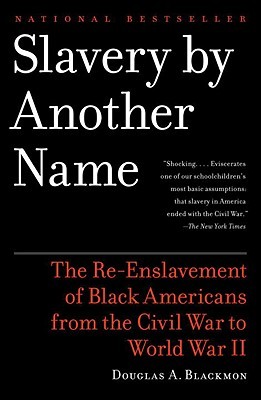| Slavery by Another Name: The Re-Enslavement of Black Americans from the Civil War to World War II Contributor(s): Blackmon, Douglas A. (Author) |
|
 |
ISBN: 0385722702 ISBN-13: 9780385722704 Publisher: Anchor Books OUR PRICE: $18.00 Product Type: Paperback - Other Formats Published: January 2009 Annotation: In this historical expos, Blackmon brings to light one of the most shameful chapters in American history--an Age of Neoslavery that thrived from the aftermath of the Civil War through the dawn of World War II. photographs. |
| Additional Information |
| BISAC Categories: - History | United States - 19th Century - Social Science | Ethnic Studies - African American Studies - History | United States - 20th Century |
| Dewey: 305.896 |
| LCCN: 2009293876 |
| Lexile Measure: 1370 |
| Physical Information: 1.1" H x 5.2" W x 7.9" (1.00 lbs) 496 pages |
| Themes: - Ethnic Orientation - African American - Topical - Black History - Chronological Period - 1851-1899 - Chronological Period - 1900-1949 - Chronological Period - 20th Century |
| Descriptions, Reviews, Etc. |
| Publisher Description: This groundbreaking historical expose unearths the lost stories of enslaved persons and their descendants who journeyed into freedom after the Emancipation Proclamation and then back into the shadow of involuntary servitude shortly thereafter in "The Age of Neoslavery." By turns moving, sobering, and shocking, this unprecedented Pulitzer Prize-winning account reveals the stories of those who fought unsuccessfully against the re-emergence of human labor trafficking, the companies that profited most from neoslavery, and the insidious legacy of racism that reverberates today. Following the Emancipation Proclamation, convicts--mostly black men--were "leased" through forced labor camps operated by state and federal governments. Using a vast record of original documents and personal narratives, Douglas A. Blackmon brings to light one of the most shameful chapters in American history. "An astonishing book. . . . It will challenge and change your understanding of what we were as Americans--and of what we are." --Chicago Tribune |